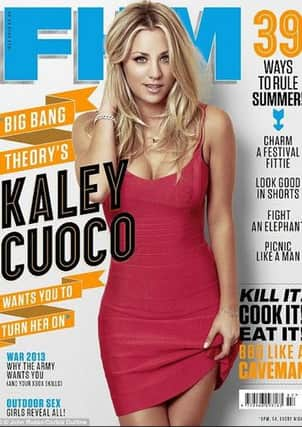Lads mags: is it the end of the road?


The genre was dealt a further blow this week after Bauer Media announced plans to “suspend” FHM and Zoo, both of which relied mainly on packaging softcore pornographic images of young women to a mostly male audience. In 2011, a high profile campaign was launched calling for the raunchy magazines to be either removed from newsagent’s shelves or covered up. Now it seems the internet has done for lads’ mags what campaigners couldn’t.
Bauer Media has announced plans to suspend publication of lads’ magazines FHM and Zoo.
Advertisement
Hide AdAdvertisement
Hide AdThe proposed closures, which would also affect the titles’ websites, leave 20 editorial staff at risk of redundancy.
The announcement comes shortly after the closure of Loaded - which relaunched as a website last week - earlier this year, and Nuts, which ceased publication last year.
FHM recorded an average monthly circulation of 72,180 in the first half of 2015. This was down from more than 700,000 in 2000.
Zoo’s average weekly circulation was 27,644 over the same period - down from more than 260,000 in 2005.
Advertisement
Hide AdAdvertisement
Hide AdFHM was first published in 1985 as ‘For Him Magazine’. Its new name was introduced in 1994 when it went from quarterly to monthly. Zoo was launched in 2004.
Sean Dodson, senior lecturer in journalism at Leeds Beckett University, said the decline of the lads’ mag reflected a wider trend in publishing.
“The lads’ mag is somewhat past its sell-by date now, it has its roots in the 90s with the emergence of the so-called ‘new man’, alongside which we also had the ‘new lad’, who was more jocular and boistrous. The decline of this kind of magazine is part of a broader story to do with the decline of print in general. Virtually all print sectors are suffering some form of decline. The reason is if you want things like softcore porn, stuff about cars and football, you can get it for free on the internet.
“I am in no way lamenting the loss of these magazines - they were moronic - but I will say that while the people who ran them gave in to market forces and took their product downmarket, they still had a scintilla of respectability, in that they were still skilled journalists who were still professional.
Advertisement
Hide AdAdvertisement
Hide Ad“What has replaced it is completely de-skilled - and even more moronic - there’s no-one there any more to say whether something is appropriate.”
Mr Dodson cited the website Unilad, which launched in 2010 but according to Alexa is today is ranked as the 232nd most popular website in the UK, only just behind The Sun (ranked 229) and CNN (at 228) and is ranked 1,892 in the world.
It describes itself as ‘the number one university student lad’s magazine’ and its content is, if anything, even more transparent than its print-based predecssors. It’s most recent lead stories include Ten Pretty Strange Facts You Probably Didn’t Know About Sex, a video of a homeless man being beaten up in America and 10 Things Anyone Who Grew Up In The 90s Will Remember.
Mr Dodson added: “This is what happens when society is left to its own devices and you remove a professional class of people who act as gatekeepers. It’s worrying. The same thing is happening with news. Everything is open to the public who have a role, for example in social media, and so the debate takes on a more downmarket quality. It becomes about things like celebrity news, gossip and other lightweight stories, it’s basically people giving in to their base desires.”